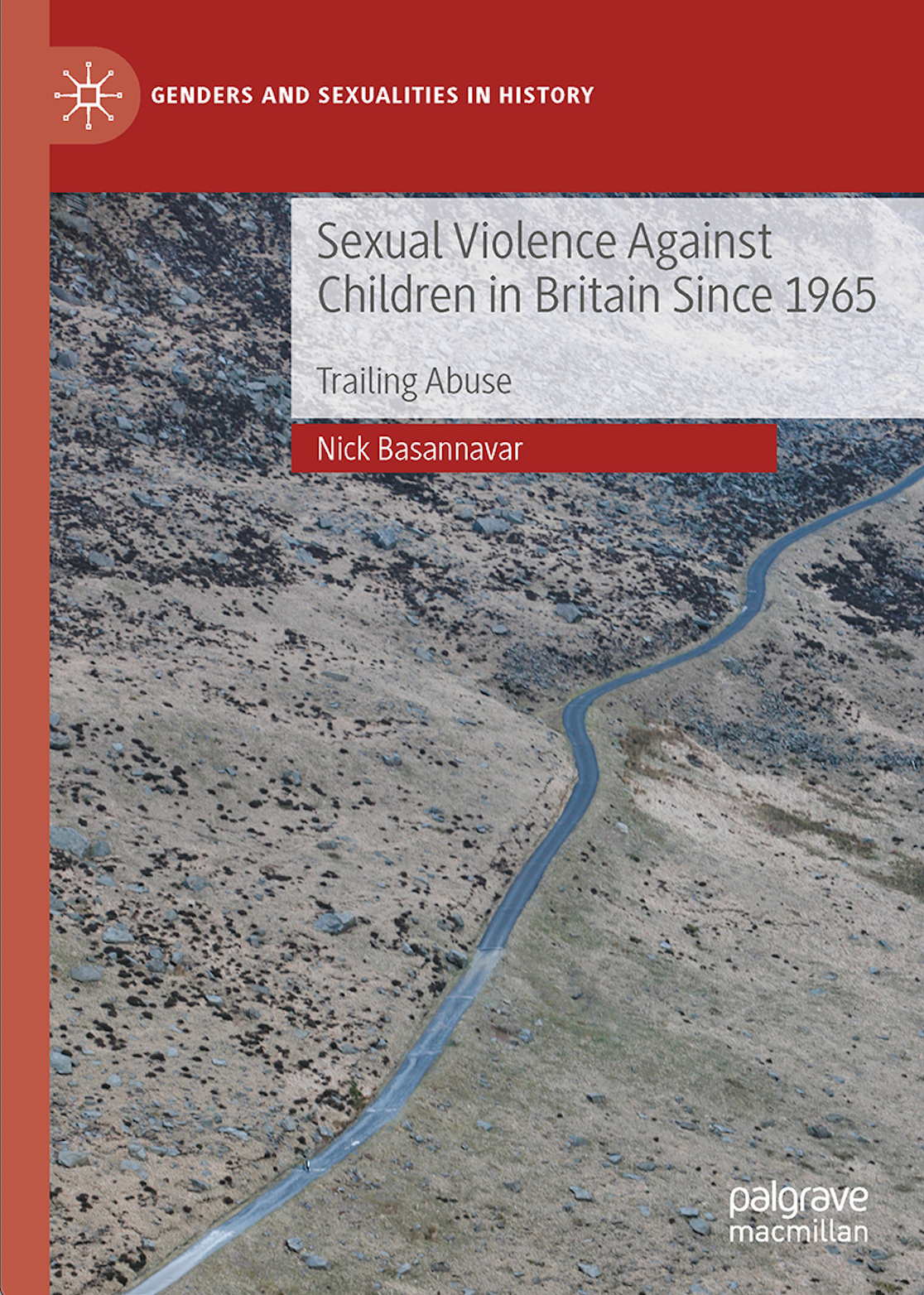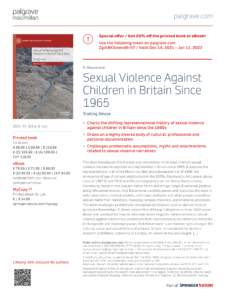Sexual Violence Against Children in Britain Since 1965: Trailing Abuse
By Nick Basannavar and reviewed by SHaME’s Joanna Bourke
 It is easy to recoil from thinking about child sexual abuse. Paedophiles are some of the most reviled members of our communities. This is why Dr. Nick Basannavar’s new book is so important. Sexual Violence Against Children in Britain Since 1965: Trailing Abuse is a sensitive yet analytical exploration of the complex and often controversial history of child sexual abuse and paedophilia in modern Britain. Basannavar has no patience for scaremongering headlines in the tabloids, nor does he resort to simplistic dichotomies that appear in some academic work, such as the shift from “silence” to “speech”. Rather his task is to examine historical shifts in the representation of child sexual abusers, from the Moors murderers in the 1960s, the Paedophile Information Exchange (PIE) in the 1970s, the controversies over abuses in Cleveland in the late 1980s, and the revelations about sexual violence carried out by Jimmy Savile for decades before his death. Basannavar is interested in what these shifts tell us about questions of sexuality, age, and violence.
It is easy to recoil from thinking about child sexual abuse. Paedophiles are some of the most reviled members of our communities. This is why Dr. Nick Basannavar’s new book is so important. Sexual Violence Against Children in Britain Since 1965: Trailing Abuse is a sensitive yet analytical exploration of the complex and often controversial history of child sexual abuse and paedophilia in modern Britain. Basannavar has no patience for scaremongering headlines in the tabloids, nor does he resort to simplistic dichotomies that appear in some academic work, such as the shift from “silence” to “speech”. Rather his task is to examine historical shifts in the representation of child sexual abusers, from the Moors murderers in the 1960s, the Paedophile Information Exchange (PIE) in the 1970s, the controversies over abuses in Cleveland in the late 1980s, and the revelations about sexual violence carried out by Jimmy Savile for decades before his death. Basannavar is interested in what these shifts tell us about questions of sexuality, age, and violence.
Although Basannavar acknowledges that sexual violence against children has always existed, he insists upon its historical specificity. He points out that during the “Moors murders trial” in 1966, the languages “child sexual abuse” and “paedophilia” were not used. Panics about “paedophiles” only emerged a decade later with the establishment of PIE. Instead, representations of Ian Brady and Myra Hindley drew more on concepts relating to sadism or older narratives based on gothic fiction. By the time of the Cleveland crisis in 1987, in which 121 children were taken into care because of fears that they had been sexually abused, talk about child sexual abuse was interwoven into worries about poverty and the crumbling of the nuclear family. The supposed power of medical professionals (especially female ones) also dominated the headlines.
For me, the most illuminating chapter is the one about Jimmy Savile. Since Savile’s unmasking in 2012 as a serial sex offender there has been a lot of discussion about how much people at the time “knew” of his offending. Basannavar takes us in a different direction, suggesting that it is more productive to think of the Savile case in terms of what it reveals about changing meanings given to past cases. He concludes his book by observing that “the history of child sexual abuse narratives is a history of echoes, revivals, entrenchments and reversals of previous registers and codes”. This is why history matters.
Finally, Sexual Violence Against Children in Britain Since 1965: Trailing Abuse is much more than a history of child sexual abusers. It offers powerful reflections on the role of language, the responsibilities of writers when speaking about violence, and the ethics of representation. It is a sensitive, nuanced, and carefully argued book that contributes not only to knowledge of the past but also to understanding current problems.
Dr Nick Basannavar is an Associate Fellow at SHaME and an Honorary Fellow of Birkbeck, University of London. His “day job” is Head of Consulting at the diversity and inclusion consultancy and think-tank, Included, which helps to build more inclusive organisations in the public and private spheres.

Sexual Violence Against Children in Britain Since 1965: Trailing Abuse will be published in Palgrave Macmillan’s “Sex and Sexualities in History” series at the end of 2021. Please join SHaME for its online launch on Tuesday 14th December, between 17.30-19.00, and get a 10% discount (see below)! More information about the event is available on our events page, and you can sign up to the launch here.
